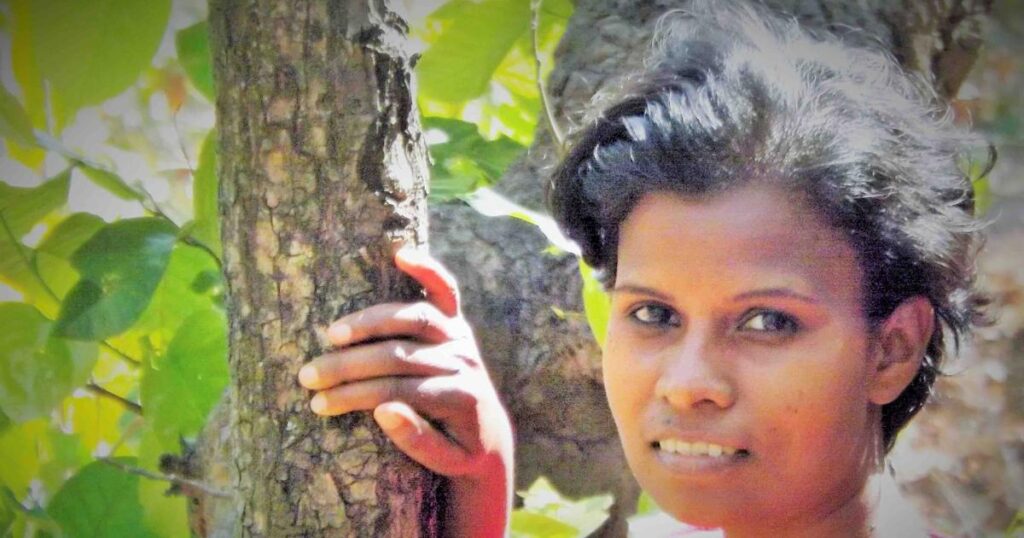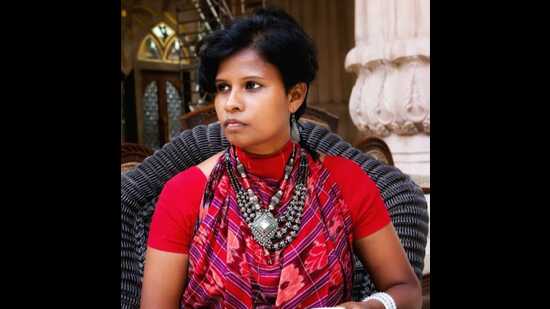
While they wait for us to “become civilized,” we are waiting for them to become human
The mainstream society’s attitude towards tribals remains harsh and demeaning. It’s a reflection of their elitism. That’s why I’ve written that while they wait for us to “become civilized,” we are waiting for them to become human. Despite our differences, we share a common humanity. It just takes courage to acknowledge it says Jacinta Kerketta.
Adil Madathil a journalist and poet from Kerala speaks with Jacinta Kerketta, a poet and media activist from Jharkhand’s tribal community, who made headlines by rejecting the ‘India Today Aaj Tak Sahitya Samman’ in protest of the mainstream media’s neglect of tribal issues.
By turning down the India Today Aaj Tak Sahitya Samman for your poetry collection Ishwar Aur Bazar, you have once again brought the nation’s attention to the invisibility of tribal issues in mainstream Indian media. You also highlighted the media’s role in downplaying the Kuki genocide during the Manipur riots. How do you assess the mainstream media’s role in marginalizing tribal communities in the current political scenario?
In this country, tribal issues and struggles are rarely understood in their true essence. The so-called mainstream society still views us through a colonial lens, as if we are anti-development and uncivilized. The media does little to challenge this perception. There are hardly any tribal voices in mainstream media, deepening the elitism. The media has always been indifferent, especially towards the tribals of the North East. This is an undeniable fact.
How has your work in the media shaped your understanding of tribal issues? What inspired you to become a freelance journalist, and do you see hope for change through grassroots journalism?
My journey into journalism was born out of personal pain. When I was young, my uncle was mob lynched by dominant people from a nearby town. The mainstream media did not cover our side of the story. To make matters worse, it wasn’t the perpetrators, but members of my own family who were arrested and jailed. We had no platform to voice our truth. That’s when I realized I had to write, to give voice to my people. That’s why I became a journalist.
After working for newspapers for a few years, I found that the platforms available to me weren’t sufficient for what I wanted to express. However, opportunities like the UNDP fellowship allowed me to go into villages and document their realities. There are journalists like P. Sainath, who I have collaborated with, and platforms like the People’s Archive of India (PARI), that focus on the lives of villagers and tribals. Such journalism is sensitive and rooted in the truth of people’s lived experiences.
Media that raises awareness, preserves humanity and embraces diversity can bring change. However, for mainstream media, tribal communities are often seen only as a market to exploit, robbing them of strength, trust, and hope.

Your poetry offers a voice to those displaced by so-called “development”—tribals pushed from their lands. As a tribal poet writing in Hindi, could you tell us about your approach to writing, and why you chose Hindi as your medium?
Tribals have sacrificed the most for the country’s development, yet they have reaped none of its benefits. I try to capture this reality in my poetry. I write in Hindi so our stories can reach beyond our communities, to be heard by mainstream society and the centers of power. For me, language is a weapon.
At the same time, I aim to preserve our indigenous languages, knowledge, and consciousness. I bring words and ideas from our world into Hindi. It serves as a bridge between different tribal groups, and many tribes are now writing in their languages as well.
There are persistent calls for the “civilizing” of tribals, but your poetry calls on others to rediscover their humanity. Mainstream society still views tribals as relics of the past, and in some places, like Kerala, tribals are even exhibited in “living museums.” Can the gap between tribal and mainstream society ever be bridged?
The mainstream society’s attitude towards tribals remains harsh and demeaning. It’s a reflection of their elitism. That’s why I’ve written that while they wait for us to “become civilized,” we are waiting for them to become human. Despite our differences, we share a common humanity. It just takes courage to acknowledge it.
Through my poetry and dialogue, I try to capture the lives, struggles, and hopes of tribals worldwide. I strive to connect with all sections of society. The truth is, everyone is confined to their narrow perspectives. We need to step out of those confines, learn about each other, and come together.
A study on tribals and mining shows that corporate governments label tribal protesters against mining companies as traitors, impose draconian laws like the UAPA, and imprison them on false charges. Strikes, protests, and arrests continue. Why is the environmental ethos of tribal values, which protect forests, water, and land, being suppressed and neglected in India?
The tribal community receives little to no consideration in police stations or cantonments in tribal areas. Policemen, often from other regions, look down on them and exploit them. They invade tribal homes at night, beat them, and extort money. Tribals are threatened with being falsely implicated in opium cultivation cases and jailed. Due to their limited knowledge of the law and lack of legal representation, they fear imprisonment. The presence of police cantonments has made their simple, harmonious lives more difficult. This constant pressure fuels ongoing protests.
Tribal communities view everything as interconnected. However, even environmentalists with mainstream education often fail to grasp this holistic perspective. They don’t fully understand how all elements are linked. As a result, they suggest relocating tribals to protect wildlife. In mainstream development discourse, exploiting nature is seen as the foundation for progress. But this shortsighted approach is ultimately leading society and politics to destruction because they ignore the interconnectedness of life and the environment.
You’ve written poetry and reports on developments that disrupt tribal life and livelihoods. Why are tribals always the victims of development, rather than its beneficiaries?
For years, people have been resisting coal, iron, and bauxite mining—not just in Jharkhand, but across the tribal regions of Odisha and Chhattisgarh. Tribals are displaced, and outsiders move into nearby areas. This encroachment profoundly impacts the tribals’ way of life, language, and culture. Violence against tribal women is on the rise, and freedom of movement is restricted.
As tribals protest, police cantonments are increasingly erected in their areas. The oppression of central India’s tribals continues unabated to this day.
This stems from an elitist mentality among those who wish to hoard all resources for themselves, with no culture of sharing. People in power reinforce this mindset. Tribals are always asked to make sacrifices in the name of development, bearing the brunt of displacement and migration. Who cares whether tribals can live with dignity?
Jacinta’s poems poignantly express the struggles of tribal women. You’ve also written about your mother. Are tribal women being neglected in discussions about women’s rights and freedom?
Many tribal societies are patriarchal. Although tribal women have more freedom in certain aspects than mainstream women, they still lack rights to property and land. Women are at the forefront of the tribal struggle for land because displacement impacts children, women, and the elderly the most. It’s crucial to raise awareness and foster discussion about women’s rights within tribal communities.
Prime Minister Narendra Modi announced several schemes for tribals on Janjatiya Gaurav Divas in Birsa Munda’s hometown. How do you think tribal-majority states will react to these schemes before the upcoming elections?
The BJP ruled Jharkhand for many years, exploiting the state and embodying an upper-class attitude. They did nothing to preserve tribal languages, culture, or identity, nor did they improve the living conditions of tribals. During their last tenure, Jharkhand was burning; for the first time, lynchings against tribals occurred. Amendments were proposed to laws that protect tribals, sparking protests. Many who protested were jailed. Now, the Prime Minister announces projects in Jharkhand only to maintain power. There’s no genuine concern for tribal welfare.
This interview was originally published in Malayalam at https://www.keraleeyammasika.com
Translated by A K Shiburaj
